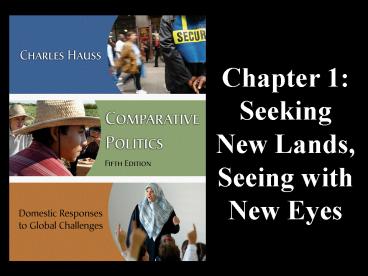Chapter 1: Seeking New Lands, Seeing with New Eyes - PowerPoint PPT Presentation
1 / 13
Title:
Chapter 1: Seeking New Lands, Seeing with New Eyes
Description:
Economic Globalization and the end of the Cold War. The international political economy ... A summary of public policy issues. A summary of historical background ... – PowerPoint PPT presentation
Number of Views:116
Avg rating:3.0/5.0
Title: Chapter 1: Seeking New Lands, Seeing with New Eyes
1
Chapter 1Seeking New Lands, Seeing with New Eyes
2
Dangers and Opportunities in a Shrinking World
- Events taking place around the world affect us
all. - Globalization popular term used to describe how
international economic, social, cultural, and
technological forces are affecting events inside
individual countries. - We live in a time of crisis.
- A critical turning point.
- The world is changing significantly and quickly.
3
Leaders in Transition
- Tony Blair, United Kingdom
- Vladimir Putin, Russia
- Mohammad Khatami, Iran
4
The State One Focus Among Many
- Power the ability to get people or groups to do
what they otherwise would not do. - Politics the process through which a community,
state, or organization organizes and governs
itself. Not exclusively about power. - What is the State?
- Government the formal part of the state
particular set of institutions and people
authorized by formal documents (such as a
constitution) to pass laws, issue regulations,
control the police, etc. - State all individuals and institutions that
make public policy and exercise power, whether
they are in the government or not. - Regime the institutions and practices that
endure from government to government, such as the
constitutional order in a democracy. - Nation primarily a psychological term to
describe attachment or identity rather than a
geopolitical unit such as the state. - Types of States
- Industrialized democracies
- Current former Communist Regimes
- The Third World
- Strong and Weak States
- Strong states one with the capacity and
political will to make and implement effective
public policy. - Weak states one without this capacity.
5
(No Transcript)
6
Comparative Politics
- What are the key similarities and differences
among states? - How can we explain those patterns?
- Comparative analysis
7
Three Templates
- The Political System
- Systems Theory
- Inputs the supports for and demands on the
system (political culture, politics, and
lobbying). - Decision making the leadership in action, using
the structure of the state. - Outputs public policy regulating behavior,
distributing resources or serving as symbols (an
output might be inaction) - Feedback
- Reactions to policy
- Results of policy
- Reporting on policy and decision-making
- Feedback as another input to the system
- The Environment
- Historical forces that limit or enable state
power - The assets and liabilities of society, the
economy, and geography - Global forces impinging on the state
8
(No Transcript)
9
Three Templates, cont.
- Historical and Conceptual Factors
- Imperialism
- State and Nation Building
- Economic Globalization and the end of the Cold
War - The international political economy
- State, Society, and Globalization
- State and society exist in an inverse
relationship for the power of one to increase,
that of the other must be reduced
10
(No Transcript)
11
(No Transcript)
12
Five Themes
- Conflict
- Democratization
- Capitalism
- Globalization
- Challenges of the Twenty-First Century
13
Using the book
- Each country chapter follows a format
- An introductory anecdote to raise questions about
the peculiarities of the nation - A profile of the nation and society
- A section on the stakes of politics (what is to
be gained and lost) - A description of the state
- A summary of public policy issues
- A summary of historical background
- A description and analysis of political culture
- An analysis of political participation
- A conclusion with some speculation about the
future































